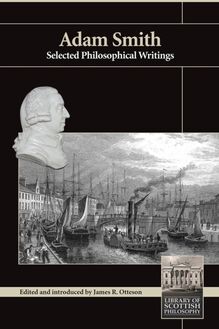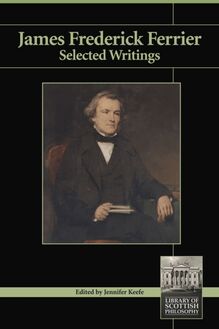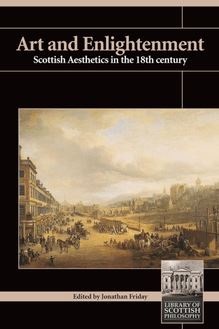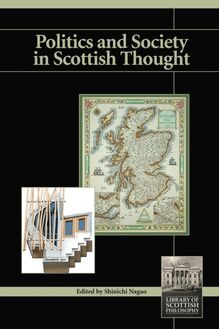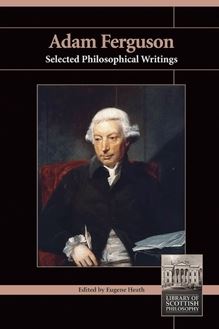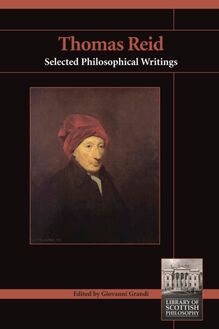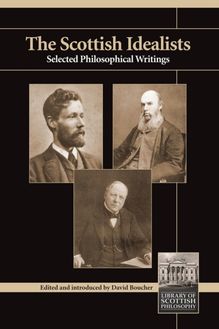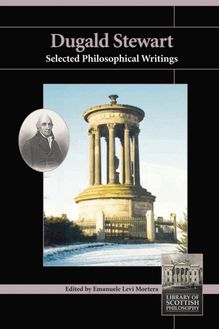Francis Hutcheson , livre ebook
160
pages
English
Ebooks
2014
Vous pourrez modifier la taille du texte de cet ouvrage
Obtenez un accès à la bibliothèque pour le consulter en ligne En savoir plus
Découvre YouScribe en t'inscrivant gratuitement
Découvre YouScribe en t'inscrivant gratuitement
160
pages
English
Ebooks
2014
Vous pourrez modifier la taille du texte de cet ouvrage
Obtenez un accès à la bibliothèque pour le consulter en ligne En savoir plus
Publié par
Date de parution
06 octobre 2014
Nombre de lectures
2
EAN13
9781845405083
Langue
English
Publié par
Date de parution
06 octobre 2014
Nombre de lectures
2
EAN13
9781845405083
Langue
English
Title page
Francis Hutcheson
Selected Philosophical Writings
Edited and Introduced
By John McHugh
IMPRINT ACADEMIC
Publisher information
Copyright © John McHugh, 2014
The moral rights of the author have been asserted. No part of this publication may be reproduced in any form without permission, except for the quotation of brief passages in criticism and discussion.
Originally published in the UK by Imprint Academic PO Box 200, Exeter EX5 5YX, UK
Originally distributed in the USA by Ingram Book Company, One Ingram Blvd., La Vergne, TN 37086, USA
2014 digital version by Andrews UK Limited
www.andrewsuk.com
Full series details:
www.imprint-academic.com/losp
Series Editor’s Note
The principal purpose of volumes in this series is not to provide scholars with accurate editions, but to make the writings of Scottish philosophers accessible to a new generation of modern readers in an attractively produced and competitively priced format. In accordance with this purpose, certain changes have been made to the original texts: Spelling and punctuation have been modernized. In some cases the selections have been given new titles. Some original footnotes and references have not been included. Some extracts have been shortened from their original length. Quotations from Greek have been transliterated, and passages in languages other than English translated, or omitted altogether.
Care has been taken to ensure that in no instance do these amendments truncate the argument or alter the meaning intended by the original author. For readers who want to consult the original texts, full bibliographical details are provided for each extract.
The Library of Scottish Philosophy was originally an initiative of the Centre for the Study of Scottish Philosophy at the University of Aberdeen. The first six volumes, published in 2004, were commissioned with financial support from the Carnegie Trust for the Universities of Scotland. In 2006 the CSSP moved to Princeton where it became one of three research centers within the Special Collections of Princeton Theological Seminary Library, and with the Seminary’s financial support more volumes have been published. Selections from Francis Hutcheson is the sixteenth volume in the series and has been prepared for publication by Alexander Peterson and Jeremiah Barker, to whom a special debt of gratitude is owed.
Acknowledgements
The CSSP gratefully acknowledges financial support from the Carnegie Trust and Princeton Theological Seminary, the enthusiasm and excellent service of the publisher Imprint Academic, and the permission of the University of Aberdeen Special Collections and Libraries to use the engraving of the Faculty of Advocates (1829) as the logo for the series.
Gordon Graham,
Princeton, March 2014
Editor’s Acknowledgements
This anthology would not have been possible without the hard work of Jeremiah Barker and Alex Peterson, who turned a pile of facsimiles of Hutcheson’s 18th-century texts into the manuscript for the book you are about to read. Also making essential contributions were Noah Bradtke-Litwack, Moriah Ellenbogen, Kristin Edwards, and Christina Hambleton. The same goes for Graham Horswell and the staff at Imprint Academic.
I would like to thank Gordon Graham for providing me with the wonderful opportunity to work on this anthology. I would also like to thank Denison University for funding my trip to the February 2012 Center for the Study of Scottish Philosophy conference at which I had the good fortune to meet Gordon.
Lastly, I would like to thank Aaron Garrett for introducing me to the work of the great Francis Hutcheson.
Introduction
John McHugh
Hutcheson’s Life
Francis Hutcheson was born in 1694 into a community of Scots Presbyterian transplants to the Ulster province of Northern Ireland. [1] In 1711, he enrolled at the University of Glasgow. After six years of study, he returned to Ireland to follow in his father’s and grandfather’s footsteps by becoming a minister. However, unlike his father (and presumably his grandfather, who died in 1711), Hutcheson favored what was then called ‘New Light’ Presbyterianism, which de-emphasized certain central ‘Old Light’ doctrines like original sin, defended a relatively optimistic conception of the human condition, and maintained a generally tolerant attitude towards things non-orthodox. [2]
Almost immediately upon his return to Ireland, Hutcheson was invited to run a new ‘Dissenting Academy’ in Dublin (such schools were established for members of Protestant sects, like Presbyterianism, that ‘dissented’ from the tenets of the official Church of England). While in Dublin, he became friends with the liberal-thinking Lord Viscount Robert Molesworth (1656-1725). Association with Molesworth and his circle of similarly-minded friends undoubtedly nourished the New Light tendencies already present in Hutcheson’s thinking. Perhaps the most significant contribution that Molesworth made to Hutcheson’s intellectual development was to encourage him to study the writings of Anthony Ashley-Cooper, 3rd Earl of Shaftesbury (1671-1713). Shaftesbury’s attempt to ground morality directly in human nature instead of in divine law had a dramatic impact on Hutcheson’s own philosophy, which he introduced to the public through four brief treatises he composed and published during this period.
The first two were published together in 1725 as An Inquiry into the Original of Our Ideas of Beauty and Virtue ; the second two were published together in 1728 as An Essay on the Nature and Conduct of the Passions and Affections, with Illustrations on the Moral Sense . Around this time, he also composed and published in the Dublin Journal two series of essays, the first attacking Thomas Hobbes’ (1588-1679) attempt to explain the phenomenon of laughter in purely egoistic terms and the second attacking Bernard Mandeville’s (1670-1733) argument that the economic prosperity of a nation requires widespread vice among its citizens. Additionally, while in Dublin, Hutcheson might have written or at least started writing, in Latin and thus primarily for the use of his students, A Compend of Logic , A Synopsis of Metaphysics , and A Short Introduction to Moral Philosophy . Precise composition dates for these texts are unknown; the latter two were both eventually published in 1742, while the first was published posthumously in 1756.
The reputation boost Hutcheson received from the writings he published while in Dublin surely contributed to the University of Glasgow’s 1730 decision to offer him the position of Professor of Moral Philosophy, which was left vacant after the death of his former teacher, Gershom Carmichael (1672-1729). Hutcheson accepted the position and held it until he died in 1746. While at Glasgow, he completed a manuscript of A System of Moral Philosophy , which was published in 1755 by his son Francis and his student-then-colleague William Leechman (1706-1785). Working with another colleague, James Moor (1712-1779), Hutcheson also completed and published an English-from-ancient-Greek translation of Marcus Aurelius’ Meditations . The rest (perhaps most) of his energy went into fulfilling his professorial duties. (Hutcheson indicates in his correspondence that he had little time for writing while at Glasgow. With the exception of the translation, most of the literary work he did there, including that on the System , further developed ideas already laid out in his Dublin writings and/ or presented in his lectures.)
Leechman’s biographical preface to the System provides a vivid, first-hand account of Hutcheson’s character both as a teacher and a human being. We learn from Leechman that Hutcheson aimed at morally inspiring his students as much as, if not more than, he did at improving their grasp of the abstract arguments and positions he taught them in theology, ethics, jurisprudence, and political philosophy. As the selections in this anthology show, Hutcheson’s writing tends to be careful and rigorous. But in his lectures, which he delivered in English rather than in the customarily-used Latin, [3] Hutcheson was often willing to sacrifice technical precision for rhetorical force and practical application (xxxiv). Leechman reports that Hutcheson’s descriptions of the virtuous life were so engaging that ‘students advanced in years and knowledge, chused to attend his lectures on Moral Philosophy, for four, five, or six years together, still finding fresh entertainment, though the subject was in the main the same every season’ (xxxiii-iv). Yet he did not merely moralize. He also inculcated such an ‘ardor for knowledge’ and ‘spirit of inquiry’ in his students that their casual conversations often ‘turned with great keenness upon subjects of learning and taste’ (xxxvii).
It appears that Hutcheson also inspired by personal example. According to Leechman, Hutcheson was ‘distinguished thro’ his whole life’ by ‘a singular warmth of affection and disinterestedness of temper’, traits that manifested themselves in his practice of waiving fees for and providing financial assistance to students in need (ii; xxvi). His ‘public spirit’ made him enthusiastic about ‘every thing that could contribute to the improvement of human life’; thus, he ‘took great delight in planning... practicable... not airy and romantic... schemes for rectifying something amiss, or improving something already right, in the different orders and ranks of mankind’ (xxvii). And he was simply good company, due in no small part to his total lack of even a justifiable level of arrogance:
A remarkable vivacity of thought and expression, a perpetual flow of cheerfulness and goodwill, and a visible air of inward happiness, made him
